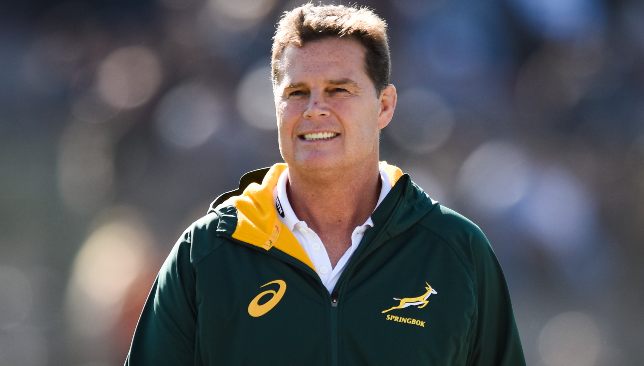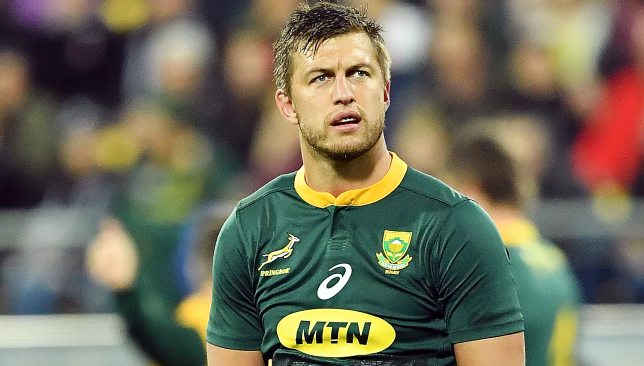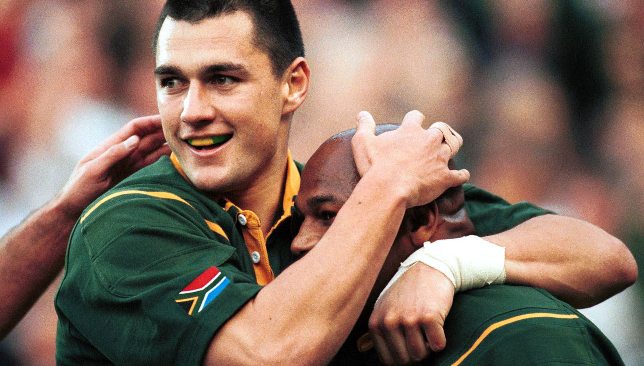
Former South Africa winger Thinus Delport is impressed with Rassie Erasmus’ confident Springboks ahead of the Rugby World Cup.
The Boks open their campaign against New Zealand in Yokohama on September 21, a match that will be the pool-shaping game.
South Africa’s recent Rugby Championship triumph has made them everyone’s dark horses to win a third global title, and although the All Blacks have had their own minor setbacks this year, it would take a brave person to go against them.
Under Erasmus though, the Springboks are purring with confidence again and look a different side to the one that struggled over 18 months ago under Allister Coetzee.
The Eastern Cape man only took over as head coach in March 2018 but has managed to build depth in most positions, capture the imagination of the South African rugby public again, clinch their first piece of silverware in a decade and create an exciting and diverse game plan.
And Delport, who played for the Springboks between 2000 and 2003, admits he has been highly impressed with the new coaching ticket and how they have improved the team in such a short space of time.
“I’ve been very impressed with them. Erasmus has only had a short turnaround time compared to the other World Cup contenders and hasn’t had a full preparation cycle. He only stepped in last year after two disappointing years for the Springboks for Allister Coetzee,” said the 44-year-old, who will appear at McGettigan’s JLT on Saturday for a World Cup Q and A alongside legends Lewis Moody and Peter Stringer.
“I don’t think he would have liked the season he had in 2018 but it was all about re-building, creating his culture and creating his plans that he wants to play under. Certainly in this short season we’ve had already, it seems that they’ve come together.
“Last year it was a surprise when they won away to the All Blacks and then lost to them closely at home. In the Autumn internationals, we had a close defeat to England but it could have gone the other way.
“It’s proven to be an upward curve since he’s been involved. The guys look confident in themselves and the way the team want to move forward.”
Winning the Rugby Championship last month – South Africa’s first trophy since the 2009 Tri Nations – was confidence-boosting and a small prize for the path that Erasmus embarked on when he took the job last year.

Victories over Australia and Argentina, and a thrilling 16-16 draw against the All Blacks has the Springboks hitting form at the right time. And there is still plenty more to come.
Returning to the traditional Springbok style of play, the powerful South Africa forwards carry the ball with ferocity and a strong set-piece sets the platform to unleash their elusive backs at every opportunity.
Players like Eben Etzebeth, Pieter-Steph du Toit, Franco Mostert, Duane Vermeulen and Malcolm Marx are all imperious with ball in hand and can make a critical difference against big opposition.
Behind the scrum, Faf du Kerk and Handre Pollard orchestrate proceedings from the half-back roles, with the searing pace of Makazole Mapimpi and Cheslin Kolbe to exploit out wide.
“Every one of the players has bought into the way they play. Under Coetzee, they played an expansive game, one that was very similar to the All Blacks play,” said Delport.
“That is still there but Rassie has taken them back to traditional strengths of Springboks rugby. It has always been forward dominated. They have found a good balance between the exciting brand of rugby and the traditional forward play.
“There is a good, accurate kicking strategy. They’ve employed an aggressive defensive system under Jacques Nienaber. The way pressure is applied and they force their opponents into mistakes is impressive. The players have bought in and the depth in each position. Not all people agree with that style of defence but it is working for the team and they are achieving great results from it.
“It is led by Faf de Klerk. His workrate, passing, energy lifts everyone around him. There is a lot of positives from the way they play at the moment.”

Behind De Flerk is perhaps the best fly-half in the world, on form, in Pollard.
The 25-year-old was one of the keys to the Boks’ Rugby Championship success, using his accurate boot and solid distribution to produce consistent attacking opportunities.
Solid if not spectacular in the draw against the All Blacks, Pollard shone against the Pumas in Salta, scoring two tries and kicking 21 points in a virtuoso display.
And Delport believes the Bulls star can emerge as a real leader this campaign if he can stay injury free and continue to get more quality game time under his belt.
“He was struggling with injuries in previous years and got injured when he played in Japan. He’s found some good form without injuries. That’s one added point. He’s always showed a lot of talent and potential. The dip in form was down to injuries,” added Delport.
“He’s playing behind a dominant pack with very good players. The quality of ball that they are generating from set-piece and phase play has allowed him to dictate the way the Springboks play.
“He’s got a measured kicking game, attacks the line when he needs to and he has a superb distribution game. It’s on the back of a strong, experienced pack that has created the opportunities for him.”
It will be fascinating to see how the Boks now deal with the increased attention in their pool opener against New Zealand.
The All Blacks are weakened by the loss of injured star lock Brodie Retallick, who will not be fit until the knockout stages of the competition.
But they can still call on the experience and class of 2011 and 2015 winners Sonny Bill Williams, Sam Whitelock and Kieran Read. And in Beauden Barrett they possess a two-time World Rugby Player of the Year.
“The benefit of the draw with New Zealand is that we play them in the pool stages. Regardless of what happens in the first game, if we do have a successful run we only meet them in the final game – if both teams progress that far,” Delport went on.
“New Zealand are still the favourites, but you have more teams capable of causing upsets on the day. That’s the beauty, attraction and excitement of the competition with so many teams that can challenge on the day and take the crown.”

On a more poignant note, South Africa lost a legend over the weekend as Chester Williams died from a heart attack at the tender age of 49.
Williams was the only black player in the Springboks squad as they clinched a historic World Cup title in 1995.
He scored four tries against Samoa in the quarter-finals before tasting glory in the 15-12 final win over New Zealand – a title that went far beyond the theme of victory as a nation came together in the early post-apartheid era.
Delport played alongside Williams for club and country over the years, winning the Currie Cup in 1999 for the Lions, and hailed the impact of one of South Africa’s most iconic players.
“He was one of my heroes growing up,” Delport said. “I was a 20-year-old when he won the World Cup in 1995. Chessie came in later on in the tournament because of injury and he missed out on the side. He stepped in at the quarter-final against Samoa and scored four tries. He become one of the faces of the Springboks win of 1995.
“We all know and understand the impact that win had on South Africa politically with that Nelson Mandela and Francois Pienaar moment. It had a huge impact, not just sporting-wise, but politically. Chester’s always been one of those faces that helped transform the country. In terms of that legendary status, he was up there with the best.
“Personally, I was very fortunate to play with him, and the amount of experience and knowledge he brought to my game development was incredible.”